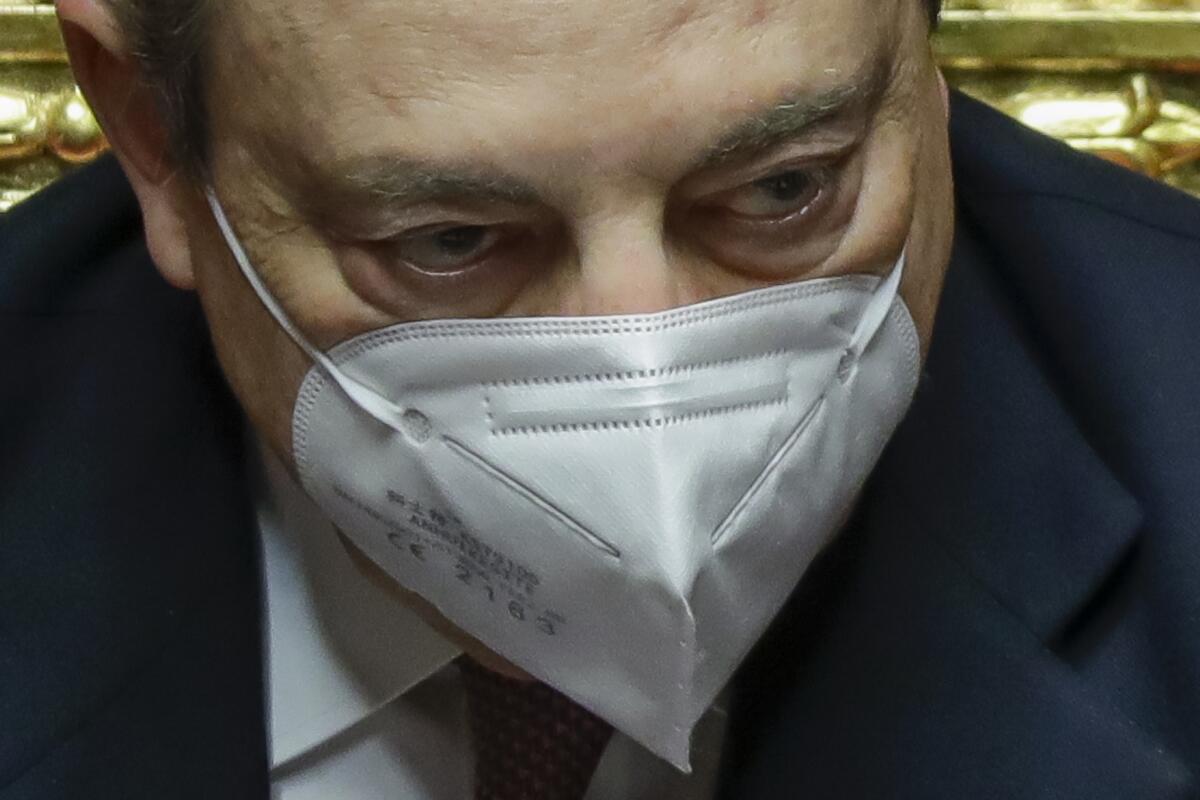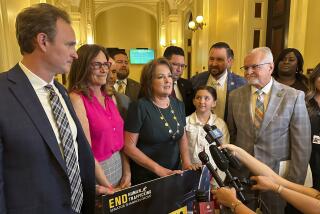Italy’s Draghi easily wins Senate backing for unity government

- Share via
ROME — Prime Minister Mario Draghi easily won a confidence vote in Parliament’s upper chamber Wednesday night after vowing to do whatever it takes to lead Italy out of the COVID-19 pandemic and rebuild its economy into a more sustainable and equitable one for future generations.
The Senate voted 262 to 40 with two abstentions to back Draghi’s technical-political government, which he formed at the request of Italy’s president to steer the country through the health and economic crises.
A confidence vote Thursday in the lower Chamber of Deputies is also expected to give Draghi broad backing, since he has secured support from across Italy’s political spectrum.
Draghi told senators that Italy has a once-in-a-lifetime chance to rethink and rebuild the country, urging them to unite behind his government, which he vowed will be environmentally conscious, staunchly pro-European and oriented toward technological and digital reforms.
“Today, unity isn’t an option; it’s an obligation,“ Draghi said to applause as he outlined his government program. “An obligation guided by what unites us all: love of Italy.”
Draghi, a former European Central Bank chief who is widely credited with having saved the euro by declaring to do “whatever it takes” during the European debt crisis, pledged a similar all-out effort to bring Italy out of the pandemic. Since the coronavirus first erupted in Italy at this time last year, the country has reported more than 94,000 deaths related to COVID-19, more than any other European country except Britain.
He said the principal aim of his administration was to confront the pandemic and save Italian lives “with all means,” including reinforcing the public healthcare system, bringing the civil protection and armed forces in to accelerate the nation’s vaccination campaign and ensuring that families can weather the economic fallout from lockdowns.
“The virus is the enemy of all of us,” said Draghi, 73, as he urged politicians to put aside their personal and political interests and assume the same spirit of sacrifice that their parents and grandparents took on after World War II.
The premier said Italy had an opportunity not seen since then to rebuild the country from the ground up using the more than $241.2 billion in European Union recovery funds. Draghi said that his government would be “convincingly” pro-EU and pro-U.S., and that he envisaged reinforcing bilateral relations with France and Germany, in particular.
It was a marked shift from the government of Prime Minister Giuseppe Conte, which in 2019 had Italy become the first Group of Seven nation to join China’s ambitious Belt and Road development initiative.
Draghi’s government was sworn in over the weekend, capping a remarkable few weeks that saw Conte, Italy’s popular premier since June 2018, resign after a key ally yanked his support over Conte’s pandemic response.
After efforts to forge a third Conte government failed, President Sergio Mattarella asked Draghi to form a high-profile, nonpolitical government.
Draghi’s 23-member Cabinet includes politicians in most ministries but puts technical experts in key roles, especially those responsible for ensuring that the funds Italy expects to receive are spent according to EU criteria. Some 37% of the allocated recovery funds must go toward environmental goals, while 20% must he devoted to digital transformation.
Italy has one of the EU’s worst records on making use of designated EU funds, a trend Draghi seems intent on ending.
“Everything wasted is a crime that we commit against future generations,” he said.
Draghi made clear that Italians who have lost their livelihoods as a result of virus-related closures would be a top priority, citing women, young people and other precariously employed workers who have borne the brunt of lockdown measures.
But he said some activities would be protected more than others, in a sign that the government would prioritize industries and jobs that fit its environmental and technology-driven focus.
He vowed investment to retrain workers for sustainable, high-tech jobs, particularly in Italy’s underdeveloped south, to combat the dual problems of unemployment and the need to transform Italy’s economy, which contracted 8.8% last year.
Draghi quoted Pope Francis in calling for a new approach to preserving the environment and Italy’s cultural and natural treasures. He said Italy’s tourism sector, which is responsible for some 13% of the country’s gross domestic product, must be helped to recover, but sustainably.
He laid out a host of planned reforms, including a wholesale overhaul of the income tax and justice systems, greater investments in education and research, and making public administration more digitally friendly to ordinary citizens.
His speech to senators won plaudits from politicians on both the left and right.
Democratic Party leader Nicola Zingaretti assured Italians their country was “in good hands.” Right-wing League leader Matteo Salvini pledged his support, praising Draghi’s call for greater healthcare spending, tax cuts and public works projects.
“A great starting point,” Salvini tweeted. “The League is on board.”
One of Salvini’s right-wing allies, however, doubled down on her opposition. Giorgia Melloni, leader of the Brothers of Italy party, said her lawmakers would vote “no” in the confidence vote, citing in particular Draghi’s emphatic comments about ceding national sovereignty for European cohesion.
“We will evaluate individual measures that come up for votes, without ceding sovereignty, which we don’t recognize,” Melloni said.
Draghi’s government also enjoyed the backing of most of the anti-establishment Five Star Movement, the biggest party in the Italian Parliament, though some lawmakers said they would vote against.
More to Read
Sign up for Essential California
The most important California stories and recommendations in your inbox every morning.
You may occasionally receive promotional content from the Los Angeles Times.










